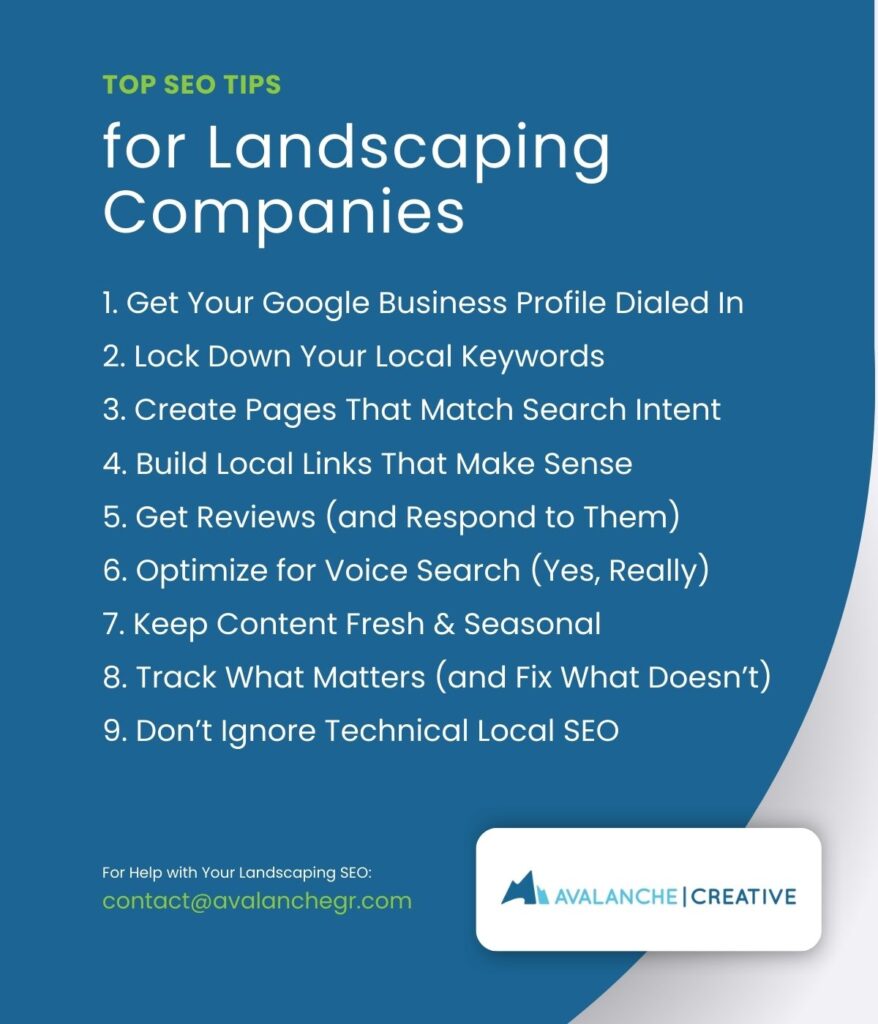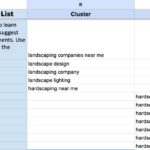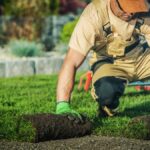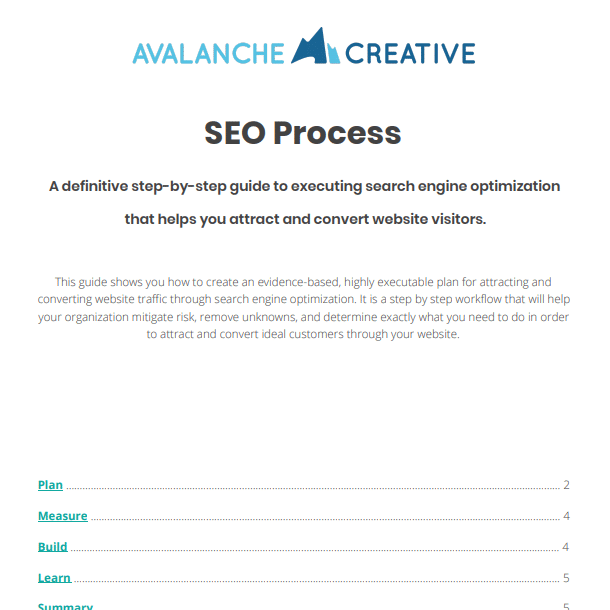Local Landscaping SEO Guide
The Local SEO Strategy Landscaping Companies Actually Need
Build a real local SEO strategy for your landscaping business. Get found by the right customers, in the right zip codes, and turn searches into service calls.
Grow Your Local Presence. Grow Your Revenue.
Great local SEO for landscaping companies doesn’t happen overnight, but it does work when you work the right plan. That means showing up for the services you actually want to sell in the places you actually serve.
If you’re ready to go beyond the basics and turn search traffic into signed contracts, Avalanche can help. We build smart, local-first SEO strategies that drive qualified leads and seasonal stability for landscaping businesses.
Let’s grow your rankings like you grow lawns.

Category: Search Engine Optimization | Tags:
If you’re still relying on yard signs and referrals to keep your landscaping business afloat, you’re missing out on where customers actually search: Google. A smart local SEO strategy puts your services in front of people in your city who are already searching for them. Less guessing = more phone calls = more booked jobs.
This guide breaks down how to make that happen, from your Google Business Profile to the right keywords to real local backlinks that move the needle.
1. Get Your Google Business Profile Dialed In
Your Google Business Profile (GBP) is your home base for local SEO. It’s what shows up in Google Maps and the Local Pack. Make sure:
- Your business name, address, and phone number (NAP) are accurate and match what’s on your site
- You’ve added services, categories, business hours, and service areas
- You upload photos of your work, especially before/afters
- You’re asking happy customers for reviews (and responding to every one)
2. Lock Down Your Local Keywords
If you want to show up when someone types “landscaper near me” or “sprinkler repair Grand Rapids,” you need to target the right search terms. Use a tool like our landscaping SEO keyword list to find the phrases your customers actually use.
Look for combos like:
- [service] + [city] (e.g., “lawn maintenance Richmond”)
- [service] + near me
- Seasonal keywords (e.g., “snow removal Everett”)
- Question-based searches (e.g., “what’s the best time to fertilize in Downingtown?”)
Here’s what those terms might look like in practice:
- hardscaping services Spokane
- lawn fertilization near me
- spring clean up in Naperville
- best landscaping company in Asheville
Long-tail keywords are gold here. They may have lower volume, but they’re way more likely to bring in qualified leads. Use Google Keyword Planner, Semrush, or even autocomplete to find real questions and phrases your customers use.
For a deeper list, check out our full landscaping SEO keyword guide.
3. Create Pages That Match Search Intent
If you only have one Services page that lists everything you do, Google won’t know which searches to rank you for. Break your services into individual pages:
- Lawn care
- Hardscaping
- Drainage
- Retaining walls
And so on. Better yet, create location pages if you serve multiple cities or suburbs (check out a great example here). Give each one a chance to rank.
Make sure every page has a clear title, strong H1, and optimized meta description that includes your core keyword for that service and location. It’s not enough to show up in the search results. You have to get clicked on.
4. Build Local Links That Make Sense
Links to your site tell Google you’re legit. The best backlinks come from other local businesses, directories, and organizations. Here’s where to start:
- Sponsor a local youth sports team or chamber event
- Join landscaping associations that list members
- Partner with nurseries or hardscape suppliers
- Get featured in local blogs or neighborhood newsletters
If your customers trust the source, Google probably will too. Bonus points for links that send actual referral traffic.
5. Get Reviews (and Respond to Them)
More reviews = more trust = better rankings. But the real win is in responding. Thank people. Address concerns. Show you’re human.
Ask for a review after every job—via text, email, or in person. Make it easy: send them the direct link to your Google profile. And if someone mentions a specific service or location in their review? Even better! That reinforces relevance for those keywords.
6. Optimize for Voice Search (Yes, Really)
More people are asking Siri, Alexa, and Google (Gemini) for help finding local landscapers. That means your content needs to clearly answer their questions.
- Use natural, conversational language.
- Include question-based headers like “What’s the best lawn care company in [city]?”
- Write short, clear answers underneath your headers.
Voice search content works great in FAQs and service pages and often helps you land in the featured snippet.
7. Keep Content Fresh & Seasonal
Your services change with the seasons. Your website should, too. Create pages or blog posts for:
- Spring cleanups
- Fall leaf removal
- Snow removal
- Holiday lighting
Seasonal content gives Google more reasons to rank you—and gives customers more ways to find you. Add internal links from your main service pages to this content to keep site authority flowing.
8. Track What Matters (and Fix What Doesn’t)
If you’re not tracking your results, you’re guessing. Use:
- Google Analytics to see traffic and behavior
- Google Search Console to see what you’re ranking for
- Google Business Profile insights to track calls and views
- A CRM like HubSpot to properly attribute and track leads
Pay attention to bounce rates, keyword clicks, and conversion paths. If a service page gets traffic but no calls, it needs a tweak.
🌱 Too busy pulling weeds to pull your rankings up? Let’s talk landscaping SEO.
9. Don’t Ignore Technical Local SEO
If your site loads slowly or doesn’t look right on mobile, Google (not to mention your customers) won’t stick around.
Here’s what to keep an eye on:
- Mobile responsiveness (the bulk of local searches happen on phones!)
- Fast site speed (especially for image-heavy landscaping portfolios)
- Schema markup to help Google understand your services and locations
- Unique meta titles and descriptions for every page
You don’t have to be a developer to get these right. Just don’t ignore them—they directly impact your rankings.
Local Landscaping SEO FAQs
How can I rank my landscaping business in local search?
Claim your Google Business Profile, get reviews, build local backlinks, and create pages for every service and location you serve.
What are the best landscaping SEO tips?
Focus on long-tail keywords, get listed in local directories, post seasonal content, and track your results.
Is SEO worth it for landscaping companies?
Absolutely. Local SEO drives qualified leads and reduces your reliance on referrals or paid ads.
Share this article:
The Avalanche Email: Fun. Simple. Educational. No Selling.
Learn Result-focused SEO & Content
Join over 2,272+ others who get one email every Wednesday with simple instructions on how to get more website traffic and leads through SEO and content marketing. (Learn more about the email)
Share this article:




![Everything a Landscaping Website Needs [Infographic with Examples & Free Resources]](https://avalanchegr.com/wp-content/uploads/2020/01/landscape-website-1-150x150.png)



